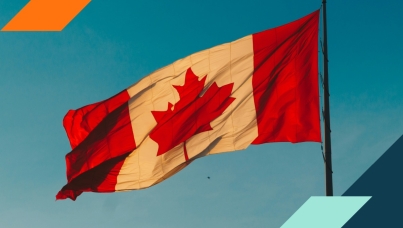As Liberals Rally Around Ignatieff in Vancouver, Grits (36%) Lead Tories (33%) Nationally, With 10-Point Lead in Seat-Rich Ontario
Toronto, ON -- As Liberals from across the country gather in Vancouver to rally around Michael Ignatieff to officially crown him as Leader of the Party, a new Ipsos Reid poll reveals that the Liberals have a slight lead over Prime Minister Harper and his governing Conservatives.
If an election were to be held tomorrow, 36% of decided voters would vote for the Liberals (up 3 points), while 33% would support the Conservatives (down 4 points). This is the first time since the October election that the Liberals have been ahead of the Conservatives, turning what was a 23-point gap in December into a 3-point lead just five months later. A ten-point gap in seat-rich Ontario (44% Liberals vs. 34% Conservatives) and a struggling Conservative Party in Quebec suggests that the Liberals would be ahead in the seat count if an election were to be held tomorrow.
The NDP would receive 13% support nationally (up 1 point), while the Green Party holds steady at 8% of the vote. Support for the Bloc is at 9% nationally, 34% within the province of Quebec. Six percent (6%) of Canadians remain undecided.
Despite the dramatic rise in support for the Liberal Party over the last few months, some Canadians remain tentative about the prospects of a Liberal government. A majority (55%) `disagrees' (28% strongly/27% somewhat) that `the Liberal Party is ready again to govern Canada'. However, 45% `agree' (12% strongly/33% somewhat) that they are in fact ready to take over, a number if translated into vote support would yield the Liberals a healthy majority in Parliament. Still, most (72%) do not believe (41% strongly/31% somewhat) that `the Liberals should bring down the Conservative government and force an election as soon as they can'. Just three in ten (28%) `agree' (8% strongly/20% somewhat) that they should defeat the Tories.
Moreover, Canadians generally still have a favourable impression of the Prime Minister when compared to the leaders of the other major parties. In fact, more (43%) believe that Stephen Harper would make the best Prime Minister than think that Michael Ignatieff (33%) or Jack Layton would be the best man for the job (23%). These proportions are unchanged since December.
When asked which of the party leaders best resemble the following attributes, this is how Canadians weighted in:
- Someone you can trust: Harper (40%, up 2 points), Ignatieff (28%, up 1 point), Layton (25%, down 4 points), Duceppe (7%, up 1 point).
- Someone who will get things done: Harper (43%, up 1 point), Ignatieff (28%, up 1 point), Layton (22%, down 3 points), Duceppe (7%, up 1 point).
- Someone who has what it takes to lead Canada: Harper (43%, up 1 point), Ignatieff (35%, up 1 point), Layton (19%, down 3 points), Duceppe (3%, unchanged).
- Someone who has a vision of Canada that you can support: Harper (42%, up 2 points), Ignatieff (30%, unchanged), Layton (24%, down 3 points), Duceppe (4%, up 1 point).
- Someone who knows when to compromise for the greater good: Harper (38%, up 4 points), Ignatieff (32%, up 1 point), Layton (25%, down 4 point), Duceppe (6%, unchanged).
- Someone who is best to manage during tough economic times: Harper (46%, up 2 points), Ignatieff (32%, unchanged), Layton (17%, down 3 points), Duceppe (5%, up 2 points).
- Despite trying to shake the opposition branding him as someone who has a hidden agenda, Harper (48%, down 3 points) also leads Layton (25%, down 1 point), Ignatieff (21%, up 2 points) and Duceppe (6%, up 2 points).
- Finally, Ignatieff (34%, up 1 point) leads Harper (32%, up 2 points), Layton (29%, down 3 points), and Duceppe (6%, up 1 point) when it comes to being someone who is open to the ideas of others.
Much attention has been paid to the fact that Michael Ignatieff's lived outside of Canada for many years. To this end, six in ten (59%) Canadians `agree' (23% strongly/37% somewhat) that `that doesn't make him less qualified to be Prime Minister than any of the other federal party leaders'. Still, four in ten (41%) `disagree' (16% strongly/24% somewhat) with this assessment, suggesting that it is an issue for them.
Further, it looks like he'll have his work cut out for him in establishing Liberal policy, as fewer than one half (45%) `agree' that they have a `clear idea of what policies the Liberals would bring in' if they were to win the next election'.
For now, it appears that the Conservatives have a leg up on the Liberals when it comes to economic policy, as only 43% think (12% strongly/31% somewhat) that `if the Liberals were in power they would do a better job of managing the economic crisis than the Conservatives are'. A majority (57%) `disagrees' (28% strongly/29% somewhat) with this notion.
All in all, Canadians are split on whether Michael Ignatieff will win the next federal election whenever it comes. One half (47%) thinks he will (12% strongly/35% somewhat), while the other half (53%) thinks he won't (24% strongly/29% somewhat).
These are the findings of two Ipsos Reid polls conducted on behalf of Canwest News Service and Global Television:
The first poll dealing with vote intention was conducted from April 29 to 30, 2009. For the survey, a representative randomly selected sample of 1,001 adult Canadians was interviewed by telephone. With a sample of this size, the results are considered accurate to within 177 3.1 percentage points, 19 times out of 20, of what they would have been had the entire adult population of Canada been polled. The margin of error will be larger within regions and for other sub-groupings of the survey population. These data were weighted to ensure that the sample's regional and age/sex composition reflects that of the actual Canadian population according to Census data.
The second poll dealing with the Liberals and leadership was an online survey of 1034 Canadian adults, conducted via the Ipsos I-Say Online Panel, Ipsos Reid's national online panel. The results of these polls are based on a sample where quota sampling and weighting are employed to balance demographics and ensure that the sample's composition reflects that of the actual Canadian population according to Census data. Quota samples with weighting from the Ipsos online panel provide results that are intended to approximate a probability sample. Statistical margins of error are not applicable to online polls, however, an unweighted probability sample of this size, with a 100% response rate, would have an estimated margin of error of +/- 3.1 percentage points, 19 times out of 20, had the entire adult population of Canada been polled.
For more information on this news release, please contact:
John Wright
Senior Vice President
Ipsos Reid
Public Affairs
(416) 324-2002
[email protected]
About Ipsos Reid
Ipsos Reid is Canada's market intelligence leader, the country's leading provider of public opinion research, and research partner for loyalty and forecasting and modelling insights. With operations in eight cities, Ipsos Reid employs more than 600 research professionals and support staff in Canada. The company has the biggest network of telephone call centres in the country, as well as the largest pre-recruited household and online panels. Ipsos Reid's marketing research and public affairs practices offer the premier suite of research vehicles in Canada, all of which provide clients with actionable and relevant information. Staffed with seasoned research consultants with extensive industry-specific backgrounds, Ipsos Reid offers syndicated information or custom solutions across key sectors of the Canadian economy, including consumer packaged goods, financial services, automotive, retail, and technology & telecommunications. Ipsos Reid is an Ipsos company, a leading global survey-based market research group.
To learn more, please visit www.ipsos.ca.
About Ipsos
Ipsos is a leading global survey-based market research company, owned and managed by research professionals. Ipsos helps interpret, simulate, and anticipate the needs and responses of consumers, customers, and citizens around the world.
Member companies assess market potential and interpret market trends. They develop and build brands. They help clients build long-term relationships with their customers. They test advertising and study audience responses to various media. They measure public opinion around the globe.
Ipsos member companies offer expertise in advertising, customer loyalty, marketing, media, and public affairs research, as well as forecasting, modeling, and consulting. Ipsos has a full line of custom, syndicated, omnibus, panel, and online research products and services, guided by industry experts and bolstered by advanced analytics and methodologies. The company was founded in 1975 and has been publicly traded since 1999.
In 2008, Ipsos generated global revenues of e979.3 million ($1.34 billion U.S.).
Visit www.ipsos.com to learn more about Ipsos offerings and capabilities.
Ipsos, listed on the Eurolist of Euronext - Comp B, is part of SBF 120 and the Mid-100 Index, adheres to the Next Prime segment and is eligible to the Deferred Settlement System. Isin FR0000073298, Reuters ISOS.PA, Bloomberg IPS:FP



